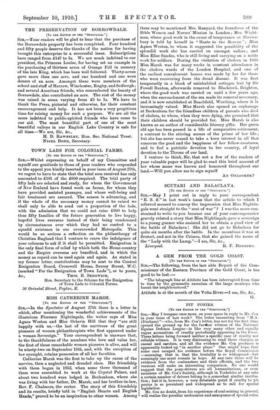MISS CATHERINE MARSH.
[To THE EDITOR OP THE " SPECTATOR."] SIR,—In the Spectator of August 27th there is a letter in which, after mentioning the wonderful achievements of the illustrious Florence Nightingale, the writer says of Miss Agnes Weston and Miss Octavia Hill that they "are still happily with us,—the last of the survivors of the great pioneers of women philanthropists who first appeared under a woman Sovereign." Your correspondent is unaware that, to the thankfulness of the numbers who love and value her, the first of these remarkable women pioneers is alive, and will be ninety-two on September 15th, and, with the exception of her eyesight, retains possession of all her faculties.
Catherine Marsh was the first to take up the cause of the navvies, then a neglected and dreaded class. Her friendship with them began in 1853, when some three thousand of them were assembled to work at the Crystal Palace, and about two hundred were lodged in Beckenham, where she was living with her father, Dr. Marsh, and her brother-in-law, Rev. F. Chalmers, the rector. The story of this friendship and its results, briefly told in " English Hearts and English Hands," proved to be an inspiration to other women. Among
these may be mentioned Mrs. Ranyard, the foundress of the Bible Women and Nurses' Mission in London ; Mrs. Wight- man, whose good work in the cause of temperance at Shrews- bury is told by herself in "Haste to the Rescue " ; Miss Agnes Weston, to whom it suggested the possibility of the splendid work she has carried on amongst sailors ; and Miss Elise Sandes, who is still living and carrying on a noble work for soldiers. During the visitation of cholera in 1866 Miss Marsh was for many weeks in constant attendance in the cholera wards of the London Hospital, and one of the earliest convalescent homes was made by her for those who were recovering from the dread disease. It was first temporarily in a block of uninhabited cottages lent by Sir Fowell Buxton, afterwards removed to Blackrock, Brighton, where the good work was carried on until a few years ago, when the encroachment of the sea made its removal necessary, and it is now established at Beachfield, Worthing, where it is increasingly valued. Miss Marsh also opened an orphanage at Beckenham for the friendless children of parents who died of cholera, to whom, when they were dying, she promised that their children should be provided for. Miss Marsh is also known as an author of considerable literary gifts. Her green old age has been passed in a life of comparative retirement, a contrast to the stirring scenes of the prime of her life ; but she has never ceased to take a keen interest in all that concerns the good and the happiness of her fellow-creatures, and to feel a patriotic devotion to her country, of loyal devotion to the Throne of our land.
I venture to think, Sir, that not a few of the readers of your valuable paper will be glad to read this brief account of her whose name was known and honoured throughout our land.—Will you allow me to sign myself
AN ONLOOKER?






































 Previous page
Previous page